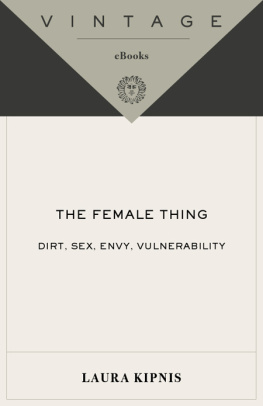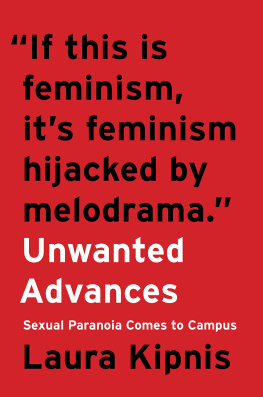PREFACE
I confess: I have a female thing. Or maybe I have a thing about the female thing, or about things female, but as a female, I don't see how you can avoid itthis thing that makes women different from men. It's pretty much the defining feature of the female condition.
I'm speaking of the female psyche, of course. Please read what follows as an account of the female psyche at the twenty-first-century mark, which is to say, in the aftermath of second-wave feminism and partway to gender equality, both factors having put many female things into question lately. Or read it as an account of one such female psychebut you have to start somewhere, right? Where better than a self-inventory: climbing on the couch, shaking out the monkeys. Let me tell you, we're talking about some seriously conflicted inner terrain at the moment, given everything that's happenedor maybe more to the point, failed to happenin terms of the female thing. I'm talking about gender progress and all the impediments to it, needless to say, since when it comes to the female situation, contradictions speckle the landscape, likeingrown hairs after a bad bikini wax.
Female progresshow's that going? Let's see. Gender barriers have largely crumbled (some exceptions remain), the dominant paradigms of patriarchy have mainly eroded (some exceptions remain), women have increasing economic independence from men if they choose to (though many don't). But then you keep stumbling across the tracks of a certain ambivalence. No, not the backlash against feminismI mean the ambivalence among women themselves.
Obviously, social progress is always a stop-start sort of affair. For one thing, the inner lives of the protagonists aren't always on the advance team, so to speak; social change goes whizzing past your ears, with the backwardish psychenot always quite so amenable to changebringing up the rear. It's sometimes been said that a colonized mentality far outlasted the political conditions of colonialism; Soviet Communism crumbled virtually overnight, but the inner apparatchik lives on. So too with female progress, it appears.
In other words, feminism came up against an unanticipated opponent: the inner woman. If something remains a little obdurate about female inequality after the last forty years or so of activism and protesting, obviously there's no shortage of external culprits to hold accountable: the Media, the Old Boys' Club, the Double Shift. And then we have the culprits closer to home. No, not men (though that's pleasantly self-exonerating)I'm speaking of the collaborator within. Not to point fingers, but without substantial female compliance, wouldn't masculine privilege pretty soon find itself crammed in with all the other debris in the trash can of history? When it comes to male power or female subjection, or whatever you want to call the current arrangement between the sexes, the complicity on the part of women themselves is well, let's just say it's complicated.
As are women's relations with individual men, consequently, lending a certain bristly, less-than-jolly quality to such interactions in recent years, with the male-female bond (most women are, after all, heterosexual) crashing up against the jagged reefs of gender reform. Of course, it's easy enough to blame all this on men, too, and many of us do, happily locating new male deficiencies on a regular basis. Thus political demands for civic rights and social equality soon gave way to demands for domestic reformMake them share the fucking houseworkwhich soon gave way to calls for a complete overhaul of the male psyche: Make them talk about their goddamn feelings. (It turns out they were just waiting to be asked and have yet to shut up.) The small problem is that despite their numerous inadequacies, these men still invariably have something that many women seem to want, and want badly (their attention, their love, their sperm for all the aspiring moms). Put all this conflicted female craving and ambivalence into the hopper and some pretty fitful sociosexual arrangements emerge. More on this to come.

Feminism has been a universal movement, though the specifics are everywhere different. Still, women across the globe are suspended between progress and tradition in one form or another (or everywhere that modernity has entered the picture, with the rest of the world soon to follow). But the traditional forms persist, soldiering on even in the most advanced places, paradoxicallyeven among the white middle-class and upper-middle-class women who are the main subjects of this book, who are supposed to be the vanguard class when it comes to gender progress, and whose emancipation should be setting the benchmark for the global female march toward equality, yet who remain so fettered in so many traditionally feminine ways. Foot binding (the conventional emblem of fettered femininity) has all sorts of cosmopolitan equivalents, though the happy new development is that they're now entirely self-imposed. What follows is a catalog of fetters, a chronicle of impasses including those within feminism itself. Yes, even at the epicenter of Western feminism, the traditional female constraints have an interesting way of reinsinuating themselves, like a scolding grandmother, covering everything with chintz and ruffles, from the couch to social policy recommendations. But when the old feminine types start reappearing in a feminist guisethe female scold, the shrinking violet, the castrating bitch, the sexless momit's probably time to clean house.
Among the many things that don't yield to progress, foremost would be women's relation to the female body. This should not come as newslook around! Self-loathing abounds, even when it's masked as self-affirmation. So let's just look it in the face, so to speak. There's a charming saying about women: pull their skirts over their heads, and they all look the same. It falls to me to report that this is indeed true, since if certain aspects of the female condition are mired in tradition, the social consequences of possessing a female anatomy would be central among those things. Having one of these things instead of one of the other things in a culture that still hands out social power and resources on the basis of what kind of anatomy you've been assigned invariably structures the female experience here on earth, and how could this not leave itsbigpawprint on interior life? Not that female anatomy dictates












